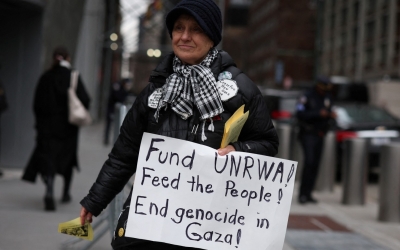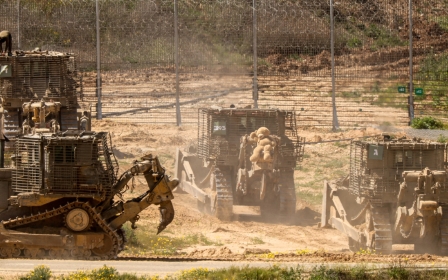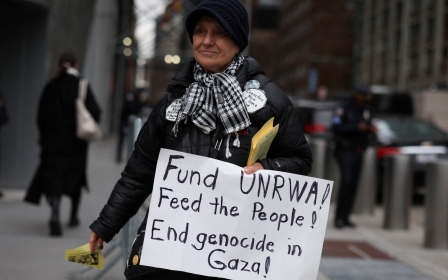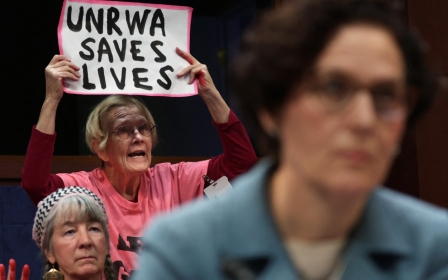For Palestinian refugees, Unrwa means survival and protection of their identity

A UN-commissioned report has finally confirmed what many Palestinians knew to be true: there is no evidence that any employees of the United Nations agency for Palestinian refugees, Unrwa, in Gaza participated in the 7 October attack on Israel.
Yet for seven months, the Israeli government has waged an aggressive smear campaign against the UN agency during its ongoing genocide in Gaza - driving several countries to suspend life-saving aid while targeting its employees, schools, warehouses, and facilities in deadly strikes.
Many have argued that Israel is explicitly targeting and seeking to destroy Unrwa as part of its strategy to eliminate the Palestinian refugee issue and the right of return.
New MEE newsletter: Jerusalem Dispatch
Sign up to get the latest insights and analysis on Israel-Palestine, alongside Turkey Unpacked and other MEE newsletters
Globally, Unrwa has become synonymous with the intractable Palestinian refugee crisis and is recognised for its work to sustain Palestinian life and resilience, particularly in the camps.
As a result, Israeli authorities have maintained a hostile policy towards the agency, often inventing pretexts to target and discredit it at all levels and forcing concessions upon its leadership.
As it continues to systematically destroy Gaza and impose its total control of the land and people, Israel has escalated its attacks on Unrwa - including making false accusations against its staff - to change its future and reformulate it to serve the occupation and western countries.
The new Gaza, as Israel envisions it - demilitarised, with no education or meaningful future for Palestinians - will be designed to make the refugees rethink, if not abandon altogether, the notion of return.
A 'national identity'
The story and history of Unrwa and that of Palestinian refugees are inextricably linked, as most Palestinians consider the agency as an acknowledgement by the international community of its responsibility for the Palestinian refugee problem.
The history of Unrwa has become part of the history - and even part of the identity - of Palestinian refugees
The passage of UN Partition Resolution 181 calling for the partition of Palestine into separate Arab and Jewish states has directly implicated the agency in the ongoing Palestinian struggle since 1947.
The resolution led to the 1948 Nakba, which resulted in the displacement of more than 750,000 Palestinian refugees and the occupation of 70 percent of Palestine.
This was followed by the passage of Resolution 194, which affirmed the inalienable rights of Palestinian refugees to return to their own land and villages that were mostly destroyed. During the same year, in 1949, the UN established Unrwa to tackle the urgent and what was believed to be a temporary situation facing refugees in surrounding areas such as Gaza, the West Bank, Syria, Lebanon, and Jordan.
Although Unrwa intended to deal with an emergency only, the issue of Palestinian refugees remains unresolved. It is as though Unrwa still exists to expose the world's failure to find a permanent solution to the Palestinian question. It further explains the situation of how an agency with temporary status and a specific mandate that needs to be renewed every three years would continue for more than 75 years.
Follow Middle East Eye's live coverage of the Israel-Palestine war
Yet, while many mistakenly view the plight of Palestinian refugees strictly through a humanitarian, economic, or political lens, they must also consider issues of identity, history, and memory.
The history of Unrwa has become part of the history - and even part of the identity - of Palestinian refugees. Palestinian refugees consider the Unrwa archives as part of their national heritage.
Some might go further to say that Unrwa, with its vital services in the camps, has been an important factor in building resilience in these communities and even shaping their national identity and memory.
By providing education, health, and relief, and employing more than 30,000 Palestinians, Unrwa has long been viewed as a Palestinian structure.
It is clear that Unrwa's robust education programme, which includes 709 schools and more than 500,000 students, has kept the national issue present in the consciousness of Palestinian refugees for generations.
This could also explain Israel's continued targeting and criticism of the organisation's education curriculum, among other areas.
On Unrwa, political sociologist Riccardo Bocco observes: "This concentration of activities on human development also contributed indirectly to the protection of Palestine refugees and their legitimate cause, without jeopardising the right to return."
A vital service
While Palestinian attitudes towards Unrwa tend to be generally favourable, some view the agency as a tool of the international community to cover up the "original sin" that created the refugee problem.
These critics often cite as evidence the agency's blue flag, its international staff and leadership occupying key positions and controlling Unrwa's strategy and decision-making, and its reliance on donor, mainly western, funding. For them, it is a line of communication between donors and the international community on the one hand, and Palestinian refugees and leadership on the other.
Many Palestinians have also likened their relationship with Unrwa to that of a stepmother who cannot be trusted entirely due to her own interests. For them, it represents international actors that are directly complicit in the Palestinian refugee problem.
Unrwa's steps to reduce services in terms of quantity and quality were therefore always met with demonstrations, strikes, and other forms of popular resistance from the Palestinian people.
For instance, Palestinian refugees pushed back against the organisation when it stopped its activities in the Yarmouk camp or other such camps facing dire need in Syria due to security concerns. The agency was also accused of complicity when it halted its activities in northern Gaza during the current genocide there.
Unrwa's attempts, influenced by donor pressure, to change its education curricula have been challenged by the refugee community, which refuses to change the map of Palestine and other details central to the Palestinian issue.
Yet in the face of attacks, especially those against Unrwa's staff members after 7 October, Palestinians have condemned Israeli attempts to discredit the agency and the West's suspension of funding to it. For refugees, Unrwa means survival and the protection of an internationally recognised cause and identity.
Ultimately, though it may face some criticism and resistance, Unrwa's existence is vital for Palestinian refugees who are ready to defend and protect or challenge and resist any changes to its policies or services.
Eliminating refugees
Central to the Palestinian cause is the people's struggle to preserve their identity against erasure, ethnic cleansing, and apartheid.
Since 1948, Palestinian families have been shattered and fragmented and made into interminable refugees.
The failure of the international community to achieve a just solution has created in Palestinians a perpetual refugee "state of mind" and urgency to return to "normal" life.
These communities are still deeply invested in returning to their home country and villages - seeking to move from passive refugees to active returnees, as Ghassan Kanfani wrote in his literature.
In reality, much of Israel's hostility towards Unrwa is due to the vital role it plays in alleviating the dire humanitarian crisis in Gaza
The refugees expelled during the Nakba were the first to demand justice and resist settler colonialism between 1948 and 1964. This era was marked by the will and determination of refugees to return to their lands, including fighting a guerilla war and crossing the border into their villages.
The cemeteries of martyrs in the Palestinian camps, which contain the remains of thousands of fighters, bear witness to this.
It is also no coincidence that the Palestinian camps in Jordan, Lebanon, and Syria played the most crucial role in the Palestinian resistance until the signing of the Oslo Accords. The role of Palestinian refugees in the West Bank and Gaza during the First and Second Intifadas has become well known. The camps in Jenin, Tulkarm, and others represented the backbone of the resistance.
Many have also pointed out that more than 80 percent of Gaza's population are refugees, and 90 percent of the resistance leaders and members are of refugee origins.
Thus, the exclusion of Palestinian refugees from peace settlements and the failure to offer them a just resolution is what has primarily kept the resistance alive and doomed negotiations.
As scholars have asserted: "There will be no Israeli-Palestinian peace agreement if the question of refugees remains unresolved, and the question of Palestinian refugees will not be resolved without the concrete prospect for an overall Israeli-Palestinian agreement."
Despite Israel's discriminatory policies against Palestinians, it has blamed Unrwa for its alleged inability to solve the problem of Palestinian refugees through programmes that integrate them into their host countries. Instead, it claims that Unrwa works to strengthen and protect this status.
Israel and its western backers have further accused Unrwa of encouraging violence and terrorism through its educational curriculum and have long pressured Unrwa to change its curriculum to a more "peaceful" one that ignores the history of Palestine and refugees and convinces children to give up their rights.
After 7 October, Israel escalated its attacks on Unrwa, going as far as making unsupported claims against Palestinian staff members as being "terrorists" or human shields for the Palestinian resistance.
In reality, much of Israel's hostility towards Unrwa is due to the vital role it plays in alleviating the dire humanitarian crisis in Gaza. As Israel carries out its genocidal war against Palestinians, its intent to eliminate not only all avenues of support but also potential witnesses to the massacre is brutally clear.
At present, Israel has destroyed most Unrwa facilities in Gaza and killed more than 162 members of its staff - most of whom were off-duty. By destroying Unrwa's foundations, Israel seeks to remake it in its image with a new mandate and entirely different leadership.
So far, every Israeli smear and attack against the agency has confirmed Unrwa Commissioner-General Philippe Lazzarini's belief that the goal is not simply to destroy Unrwa but to eliminate the issue of Palestinian refugees.
The views expressed in this article belong to the author and do not necessarily reflect the editorial policy of Middle East Eye.
Middle East Eye delivers independent and unrivalled coverage and analysis of the Middle East, North Africa and beyond. To learn more about republishing this content and the associated fees, please fill out this form. More about MEE can be found here.






